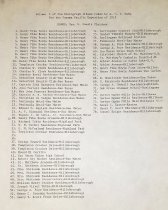Person Record
Metadata
Name |
Bowie, Henry Pike |
Notes |
The reading of Henry Pike Bowie's will dropped like a bombshell on peninsula society in 1920. He left a sizable portion of his estate to a Japanese family that turned out to be his family. In Japan it was well known that he was the head of a household, but no word of it had reached here. Henry was the third husband of Agnes Poet Howard. By all accounts, theirs was a happy marriage. She was many years his senior, and when she died in 1893, she left a fifth of her estate to Bowie. She had inherited a sizable fortune from her two former husbands, who were brothers. She provided for her adult children handsomely with the other four fifths of her estate. Henry had studied law, but his real interests were in other areas. It was said he only practiced law once. That was a suit against the town of Burlingame when the Marshall impounded some of his cows from his Severn Dairy Farm. He was an avid gardener. Of course, he didn't personally dig in the soil, but he directed the planting and cultivation done by his staff. His projects included the planting of eucalyptus at Coyote Point and a Japanese garden. Bowie was well liked and respected. He was a member of the Burlingame Country Club and the San Mateo Polo Club. He was a patron of the arts. He also had a life long admiration for things Japanese. He studied the Language and read Japanese literature. He became an authority on Japanese art, and wrote several works on the subject. The design of his home at Severn Lodge was of Japanese derivation with some Spanish touches. He was credited with awakening San Francisco Society to Japanese culture. He arranged an exhibit of Japanese color prints at the Bohemian Club. After the death of Agnes, Bowie took his first trip to Japan. He spent much time there over the next 27 years. He made five more trips during that period. At his home in San Mateo, he built a memorial victory gate to commemorate the Japanese victory over Russia in the Sino-Russian war. He brought the materials and the artisans from Japan to do the work. The Mikado recognized him with honors on two occasions. On his last trip to Japan in 1918, he went as a special emissary for the US. State Department. He didn't return until 1920, just two months before he died. In January 1921, Bowie's hand written will went into probate. He left specific sums to his sister and two brothers. Of the remainder of his fortune, he left one half to his third brother, and the remaining half to Komaka Hirano, Imao Hirano and Takeo Hirano of Yokahama, Japan. It turned out that this was his wife and two sons. Bowie's stepson, George Howard, filed suit to break the will. He claimed that the Hiranos had just been Bowie's "hosts" in Japan. He said that they had used undue influence on Bowie and that he had been suffering from some mental impairment. He said that since the money had come from his mother, the Howards were entitled to it. Judge Buck threw the case out of court, and the Hiranos were able to collect their inheritance. (Joan Levy/2004) |
Born |
1834 |
Deceased |
1920 |
Occupation |
Attorney, Socialite, Japanese Scholar |
Titles & honors |
US Emissary to Japan, 1918 |
Places of residence |
Burlingame Yokohama, Japan |
Father |
Dr. |
Spouse |
Agnes Poett Howard, Komaka Hirano, |
Children |
Imeo Takeo |
Related Records
-
Volume I of the Photograph Albums taken by A. G. C. Hahn for the Panama Pacific Exposition of 1915 - Album, Photograph
One of three photograph albums showing San Mateo County locations. Photographs taken by A. G. C. Hahn for the Panama Pacific Exposition of 1915. Contains images 1-78. Volume I of the Photograph Albums taken by A. G. C. Hahn for the Panama Pacific Exposition of 1915 1. Henry Pike Bowie Residence-Hillsborough 2. Henry Pike Bowie Residence-Hillsborough 3. Henry Pike Bowie Residence-Hillsborough 4. Henry Pike Bowie Residence-Hillsborough ...
Record Type: Photo

